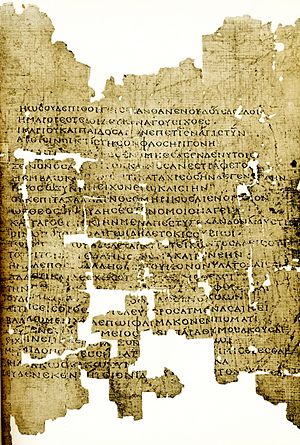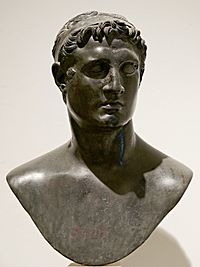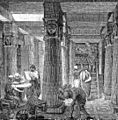Callimachus facts for kids
Quick facts for kids
Callimachus
|
|
|---|---|

Papyrus fragment from the Aetia of Callimachus
|
|
| Born | c. 310 BC Cyrene, Ptolemaic Kingdom |
| Died | c. 240 BC Alexandria, Ptolemaic Kingdom |
| Period | Hellenistic period |
| Genre | Aetiology, Epigram, Iambus, Hymn, Epyllion |
Callimachus (Ancient Greek: Καλλίμαχος, romanized: Kallimachos; c. 310 – c. 240 BC) was an ancient Greek poet, scholar and librarian who was active in Alexandria during the 3rd century BC. He wrote over 800 literary works in a wide variety of genres, most of which did not survive.

Born into a prominent family in the Greek city of Cyrene in modern-day Libya, he was educated in Alexandria, the capital of the Ptolemaic kings of Egypt. After working as a schoolteacher in the city, he came under the patronage of King Ptolemy II Philadelphus and was employed at the Library of Alexandria where he compiled the Pinakes, a comprehensive catalogue of all Greek literature. He is believed to have lived into the reign of Ptolemy III Euergetes.
Although Callimachus wrote prolifically in prose and poetry, only a small number of his poetical texts have been preserved. His main works are the Aetia, a four-book aetiological poem, six religious hymns, around 60 epigrams, a collection of satirical iambs, and a narrative poem entitled Hecale. Callimachus shared many characteristics with his Alexandrian contemporaries Aratus, Apollonius of Rhodes and Theocritus, but professed to adhere to a unique style of poetry. He dedicated himself to small-scale poetry and refused to write longwinded epic poetry, the most prominent literary art of his day.
Callimachus and his aesthetic philosophy became an important point of reference for Roman poets of the late Republic and the early Empire. Catullus, Horace, Vergil, Propertius, and Ovid saw his poetry as one of their "principal model[s]" and engaged with it in a variety of ways. Modern classical scholars view him as one of the most influential Greek poets. According to the Hellenist Kathryn Gutzwiller, he "reinvented Greek poetry for the Hellenistic age by devising a personal style that came, through its manifestations in Roman poetry, to influence the entire tradition of modern literature".
Images for kids
-
19th-century artistic rendering of the Library of Alexandria, where Callimachus compiled the Pinakes
See also
 In Spanish: Calímaco (poeta) para niños
In Spanish: Calímaco (poeta) para niños


